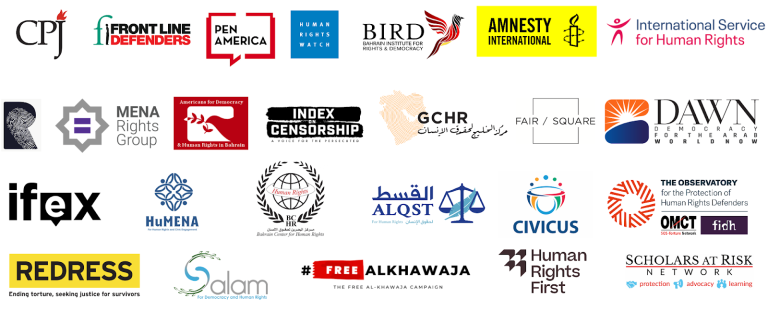20 February 2018 – 25 members of the UK Parliament wrote to Foreign Secretary Boris Johnson today, urging him to publicly call for the release of leading rights defender Nabeel Rajab and to review the Foreign and Commonwealth Office’s (FCO’s) disastrous policy towards Bahrain.
The MPs expressed “extreme disappointment in the FCO for failing to address the punitive trials and unlawful prosecutions of leading Bahraini human rights defender Nabeel Rajab, President of the Bahrain Centre for Human Rights (BCHR). Rajab has already been unlawfully convicted to two years in prison and is facing an additional 15 years over comments made on social media.”
Rajab’s trials have been postponed at least 20 times since his arrest in June 2016. His final verdict is expected on 21 February 2018.
In his current trial, Rajab faces multiple charges of “insulting a statutory body”, “insulting a neighboring country”, and “disseminating false rumors in time of war”. These are in relation to remarks he tweeted and retweeted on Twitter in 2015 about torture at Bahrain’s Jau prison and the humanitarian crisis caused by the Saudi-led war in Yemen.
Rajab’s charges of insulting Saudi Arabia in his anti-war messages are particularly pertinent, as the UK and US have sold billions in arms to Saudi Arabia since the start of the war.
Commenting Sayed Ahmed Alwadaei, Director of Advocacy, BIRD said: “Today’s letter is another reminder to Boris Johnson that the UK’s deep involvement in Bahrain gives rise to a greater responsibility to criticise its allies for prosecuting a leading peace advocate. This especially applies to cases where the charges are in retaliation to the activist’s exposure of human suffering. The US & EU have called for Nabeel Rajab’s release; it’s time for the UK to follow suit.”
FCO Policy
The rhetoric of the FCO suggests that it will combat measures that restrict civil society, and will seek to protect and improve the treatment of human rights defenders. Rajab’s case, however, demonstrates its reluctance to do so in practice when the perpetrator is an ally of the United Kingdom.
The FCO has avoided expressing concern over Nabeel Rajab’s sentencing in its answers. In their latest statement on 14 February, they stated: “We continue to monitor the case of Nabeel Rajab closely and have raised it at a senior level with the Government of Bahrain.”
Since 2012, the UK has spent more than £5 million on technical assistance to Bahrain, and has allocated a further £1.5million this year, to support Bahraini oversight bodies. Since these mechanisms have demonstrably failed to end widespread torture and hold perpetrators to account, the technical assistance programme has merely served to whitewash Bahrain’s appalling human rights record.
Rajab’s case is a clear demonstration of how the FCO’s approach is simply inadequate. Its failure to take any serious action in relation to Bahrain’s reprisals against human rights defenders emboldens the Bahraini government to pursue further reprisals, which makes the FCO complicit to the human rights abuses dealt by Bahraini authorities.
International Response
Following Rajab’s sentencing on 10 July 2017, the United States, European Union and Norway all called for Rajab’s release. Germany deplored his sentence the next day while the UN Office of the High Commissioner for Human Rights called for his unconditional release in a statement released a few days later.
In September 2017, the UN condemned the increasing number of Bahraini human rights defenders facing reprisals, naming Rajab as one of the nine affected individuals. The UN Committee Against Torture has also called for Rajab’s release.
In the US, the Trump administration removed Obama-era human rights conditions on arms sales, one of which was the unconditional release of Rajab. In November, President Trump announced the advancement of $9 billion in commercial deals with the government of Bahrain.





